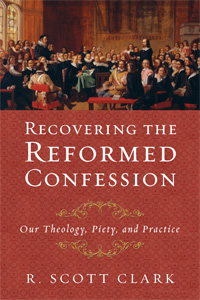XVII. From the faith of history which exhibits multiple worshipers of God and witnesses of the truth, who repeatedly opposed themselves to the papistical errors and bore testimony to the truth. For if there are granted many who by words, deeds and . . . Continue reading →
Romanism
Digital Indulgences
The UK Guardian reported yesterday that Rome has reached a new low in reaching out to the Romanist equivalent of low-information voters. Low-sanctity penitents perhaps? Rome is now offering plenary indulgences to Romanists who follow Pope Francis’ tweets from Catholic Youth Day . . . Continue reading →
Where Was Our Church Before Luther And Zwingli? (9)
From the conformity of our church to the primitive apostolic Church. For since no one can deny that the primitive church was instituted by Christ and the apostles neither can it be denied that our church, if it is conformed that both . . . Continue reading →
Reformed Is Enough Or Why I Wrote RRC
David J. Miller published a lengthy account yesterday of his journey out of the OPC to Eastern Orthodoxy and to Anglicanism of different sorts and back to confessional Presbyterian and Reformed theology, piety, and practice. It’s a long-ish piece but it’s a . . . Continue reading →
Tyndale’s Application of the Regulative Principle
Mark well how many parsonages or vicarages are there in the realm, which at the least have a plow-land a-piece. Then note the lands of bishops, abbots, priors, nuns, knights of St John’s, cathedral churches, colleges, chauntries, and free-chapels. For though the . . . Continue reading →
Standard Reformed Polemics Against The Use Of Musical Instruments In Worship
But all light into, all perceptions of, this glory, all experience of its power, were, amongst the most, lost in the world. I intend, in all these instances, the time of the Papal apostasy. Those who had the conduct of religion could . . . Continue reading →
Crums! You Mean Rome Isn’t Completely Unified?
So just when Jason and the Callers thought they had escaped the unsatisfying clutches of Protestantism, they entered a communion riven by the same kind of divisions that characterized the modernist-fundamentalist controversy. One side wants the church to continue to adapt to . . . Continue reading →
What Is True Faith? (4) Against Rome, QIRC, And Blind Faith
In part 3, we compared the Romanist (Tridentine) definitions of faith and justification to the Reformed definitions of faith and justification. According to Rome, in the Council of Trent, anyone who teaches that sinners are declared righteous before God only (sola) on . . . Continue reading →
You Are What Rome Says You Are Even If She Openly Contradicts Herself
On every front, then, the Council redrew the boundaries of what had seemed to 1959 a fixed and immutable system. For some Catholics, these changes were the long-awaited harvest of the New Theology, the reward of years of patient endurance during the . . . Continue reading →
Christ Is The Mark
…Christ is the mark whereat faith must aim; and, therefore, men’s minds do nothing else but wander when they turn aside from him. Therefore, no marvel if all the divinity of Popery be nothing else but an huge lump and horrible labyrinth; . . . Continue reading →
Calvin: Rome Is A Bird With Borrowed Feathers
Having ascertained Paul’s meaning, let us return to the Papists. First, by applying this eulogium to themselves, they act wickedly; because they deck themselves with borrowed feathers. For, granting that the Church were elevated above the third heaven, I maintain that it . . . Continue reading →
Telling The Truth To A Skeptical Millennial Village
Most of the students I teach are so-called Millennials. A few generations ago Americans were raised by parents. Then they were raised by the television. This generation was raised by the computer and related (mostly mobile) media. As Thomas de Zengotita has . . . Continue reading →
Justification And Sanctification: Conjoined, Coherent, But Distinct
For he means, that not an individual among mankind will be found in whom the promise of salvation may be accomplished, if it involves the condition of innocence; and that faith, if it is propped up by works, will instantly fall. This . . . Continue reading →
Rome: “Pay Now Or Pay Later”
(HT: Dabney Olguin) More On This Topic Selling Indulgences In Case You’re Worried About Purgatory Indulgences Are Back Has The Roman Doctrine of Justification Changed? The Treasury Of The Church
The Pope’s Magic Beads
Pope Francis confessed Thursday that he took the rosary cross of his late confessor from his casket and wears it to this day in a fabric pouch under his cassock. He said he did so telling the late priest, “Give me half . . . Continue reading →
Calvin: Who Is Faithful To The Church Fathers?
Moreover, they unjustly set the ancient fathers against us (I mean the ancient writers of a better age of the church) as if in them they had supporters of their own impiety. If the contest were to be determined by patristic authority, . . . Continue reading →
John Paul II, Sister, & Billy Sunday
Yet with Rome, the grandeur and spectacle of it all somehow overwhelms and masks the fact that its trading on fundamentally the same motive that drives TMZ. It’s easy to make fun of the extremes of Americana religion, with Sister Aimee riding . . . Continue reading →
The Cadaver Synod
“…this see of St. Peter always remains unblemished by any error”—Vatican I, Session 4 (July, 1870), cap. IV.6. …A man of exceptional intelligence, exemplary life, and strict asceticism (the only fault alleged against him was ambition), Formosus had bitter and relentless foes . . . Continue reading →
Heidelberg 29–30: No Other Name (3): All Or Nothing
Since the garden humans have faced the temptation to listen to an authority claiming to compete with God’s authority. Since the beginning voices have questioned, “has God really said?” Since the beginning voices have raised doubts about whether there is really one . . . Continue reading →
Honoring But Not Venerating
Obj. 1. The saints, on account of their virtues, are to be honored with the worship either of adoration (λατρεια) or of veneration (δουλεια). But it is not in the former sense that they are to be worshipped; because this form of . . . Continue reading →





